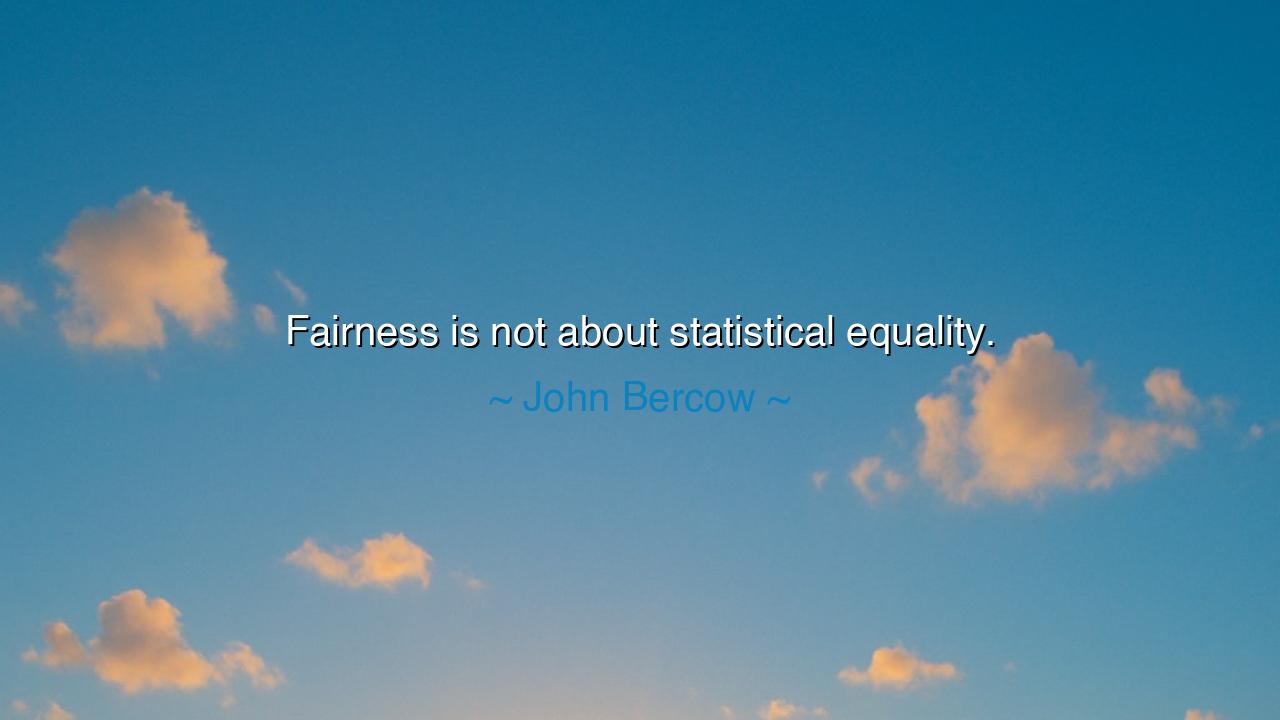
Fairness is not about statistical equality.






O children of wisdom, hear the words of John Bercow, for they hold a profound truth that resonates across time and space: "Fairness is not about statistical equality." These words speak not only to the nature of justice, but to the deeper understanding of what it truly means to be fair in the hearts of men and women. Fairness—like the most precious of gems—cannot be measured solely by numbers, nor by simple comparisons. It is the spirit of justice, the grace of balance, and the wisdom of the ages that we must seek in our pursuit of equality.
In the ancient world, when rulers and philosophers pondered the virtue of fairness, they understood that to treat all people the same was not necessarily the highest form of justice. Equality, they believed, could not be reduced to mere statistics, for to do so would be to disregard the unique circumstances, struggles, and contributions of the individual. The great philosopher Aristotle, in his wisdom, spoke of distributive justice, where fairness meant giving individuals what they truly needed, not what was mathematically equal. The rich were not given the same as the poor, for the needs of the poor were greater. In this way, fairness was not about balance in numbers, but about recognizing and meeting the deeper needs of those who were before you.
Consider the ancient Greeks, who held that the harmony of society depended on each member contributing to the whole according to their ability. To give the same to all, regardless of their capacity or circumstances, would create disharmony, for it would ignore the real needs of the individual. They understood that a just society was one where fairness was rooted in wisdom, where people were treated according to their true worth and needs. The idea that fairness is not about statistical equality is as old as civilization itself, and it has guided leaders, philosophers, and scholars through the ages, shaping the principles of justice that we hold dear today.
John Bercow’s statement speaks to a truth that is deeply embedded in the human experience—that true fairness is about seeing the individual in all their complexity. It is not enough to say that all are equal; one must see the different needs, struggles, and gifts of each person and respond accordingly. In this way, fairness requires wisdom, the wisdom to recognize that people’s needs are not the same, and that equality cannot be reduced to a simplistic formula. It is not about giving the same to all, but giving what is right for each person to flourish. Fairness is rooted in understanding the context, the background, and the unique circumstances of each life.
Consider the example of Nelson Mandela, whose life is a testament to this very principle. When he emerged from the long darkness of imprisonment, Mandela did not call for the statistical equality of the past. He did not demand an eye for an eye, nor did he seek to balance the wrongs done to him and his people with equal harm to others. Instead, he called for reconciliation—for a deeper justice that transcended mere numbers. Mandela’s wisdom lay in his understanding that fairness was not about treating everyone the same, but about recognizing the needs of those who had suffered the most and providing them with the means to heal and rebuild. His vision was of a South Africa where individual circumstances were taken into account, where fairness was not measured by simple equality, but by the recognition of past injustices and the need for healing.
The lesson we must take from Bercow’s words is clear: fairness does not lie in the cold mathematics of numbers, but in the recognition of human dignity and need. Statistical equality is a shallow measure of justice; it ignores the complexities of the human condition and the context within which each person lives. If we are to be truly just, we must move beyond the simplistic notion of equality and understand that fairness is a dynamic, thoughtful process that considers the unique circumstances and needs of each individual.
So, O seekers of wisdom, what can we do in our own lives? We must seek to be fair in our dealings with others, not by adhering strictly to the principle of equality in numbers, but by embracing the principle of equity—treating people according to their unique needs and potential. In our families, our communities, and our workplaces, we must ask ourselves not, “Are they treated equally?” but, “Are they treated fairly?” Does each person receive what they need to thrive, given their own situation, their own struggles, their own gifts? In our laws, in our education, in our leadership, let us strive for a fairness that takes into account the full complexity of the human soul, and let us build a world where true justice is rooted in understanding, not just numbers.
May we walk with wisdom, recognizing that the pursuit of justice is not found in the simple counting of equal portions, but in the deep, compassionate understanding of what is truly right for each person. Let us strive, then, to create a world where fairness is not just a matter of statistical equality, but a matter of human flourishing, where each individual is given what they truly need to reach their fullest potential. And in doing so, may we leave a legacy of justice that transcends the limits of numbers and touches the very soul of the human spirit.






AAdministratorAdministrator
Welcome, honored guests. Please leave a comment, we will respond soon